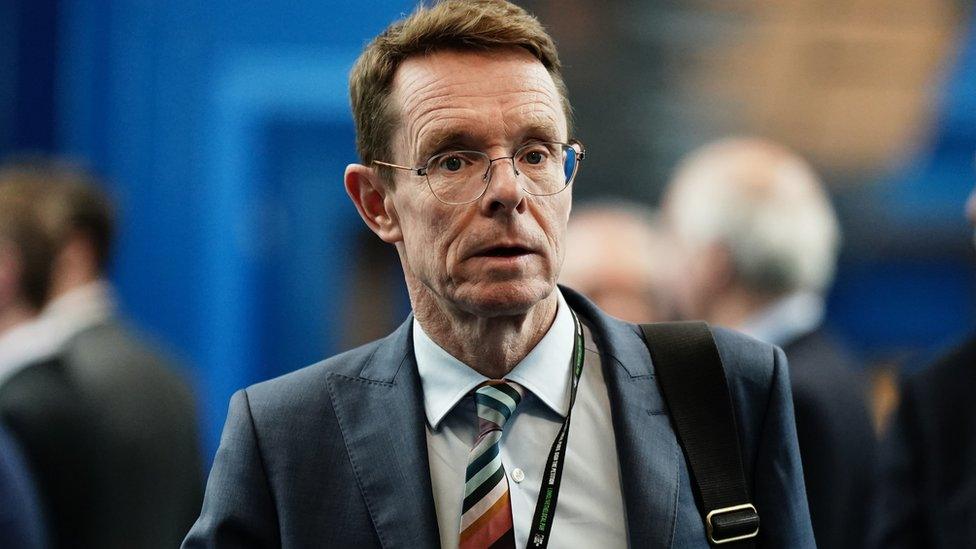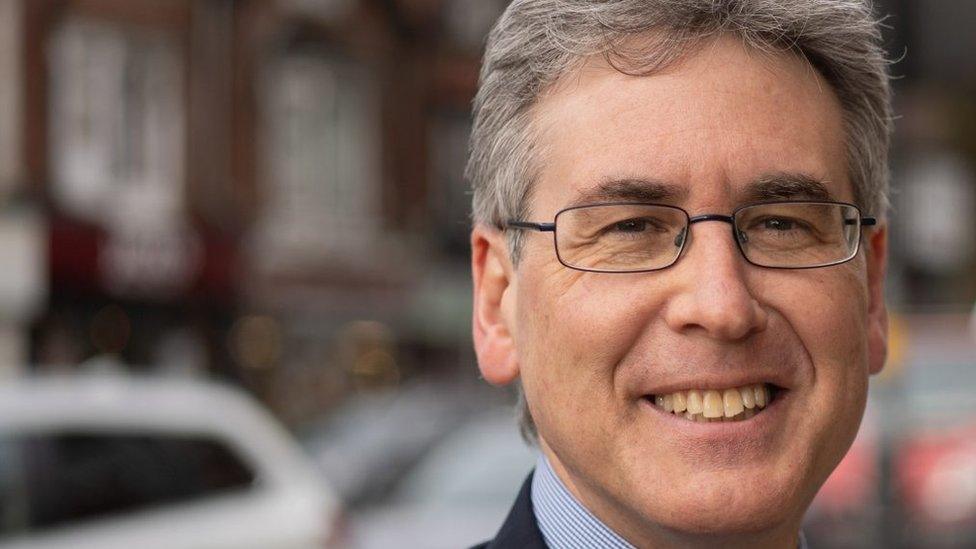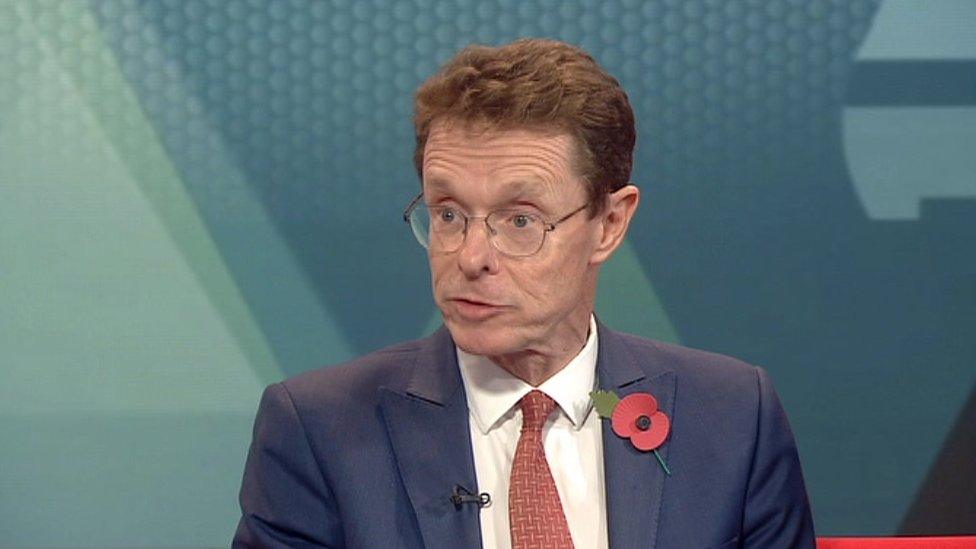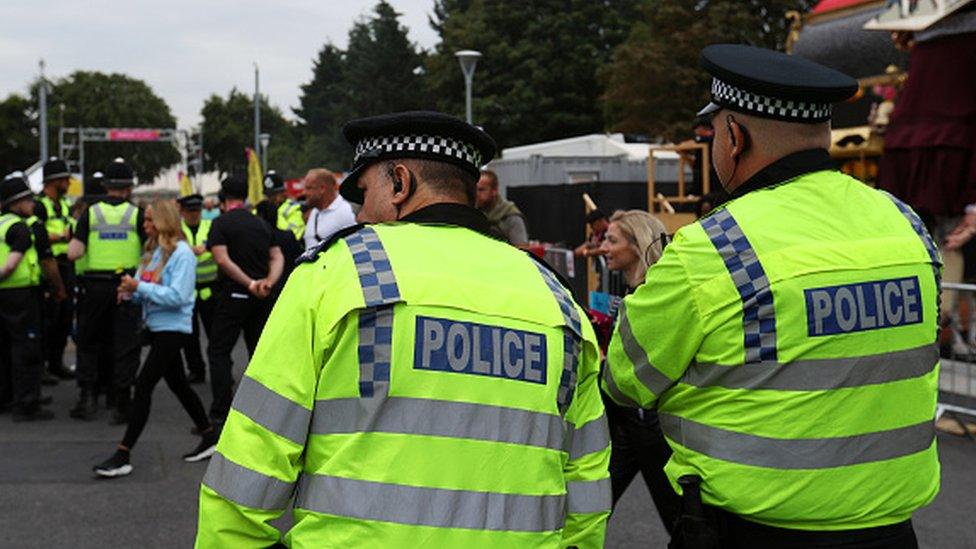West Midlands mayor Andy Street calls for crime commissioner powers
- Published

Andy Street has written to the Home Secretary, asking for the transfer of powers
The West Midlands mayor should be handed powers of the Police and Crime Commissioner after the next mayoral election, the current mayor says.
Conservative Andy Street has acted because "crime in this region has more than doubled... and I simply cannot allow it to go on any longer".
Mr Street, who has written to the home secretary, said currently police were not being properly held to account.
But the Labour PCC said such a move would be "profoundly undemocratic".
Simon Foster, who was elected to the role in May 2021, said residents "should be able to decide for themselves" about the issue.
In a statement, Mr Foster wrote: "It is nothing more than a hostile takeover. This cynical power grab is in no-one's interests, save that of the government and its West Midlands mayor."

Labour's Simon Foster was elected as the West Midlands Police and Crime Commissioner in 2021
In his letter, Mr Street referred to new powers the government holds under the Levelling up and Regeneration act, allowing it to transfer the powers of PCCs to elected mayors.
He said West Midlands Police had a "very capable" chief constable, but said: "It is clear the current PCC model is not holding [the force] well enough to account, to drive down crime and ensure people across the region feel safe."
The move would also help coordinate working on projects such as regeneration, Mr Street said.
'People... are concerned'
When questioned on the proposal, Mr Street rejected Mr Foster's "hostile takeover" claim, saying that the electorate would get to decide in May, adding: "That is democratic."
He pointed to the mayors in places like London and Greater Manchester, who are also responsible for the police in their areas.
"This is a model that is proven to be an effective way of leading in big city regions," he said.
Mr Street said that crime across the region had doubled in the last eight years, adding that it was in "the worst positions in the country for violent crime".
He added: "You can not tell me that the current model is working. People across the region are concerned about it."
The city region's mayor claimed there were two "big advantages" of the proposed model - having one person "clearly accountable for leading this region" and combining the powers of the mayor and PCC to "really drive down crime rate".
He said: "The situation here is worse than in other areas of the country. The current model has not delivered for citizens and what will happen, is citizens will judge at the May elections who they believe is best positioned to lead this piece of work."
He referred to the PCC's decision to close 30 police stations, describing it as "not the right approach to strengthen community policing".
'Power grab'
Mr Foster said he "deeply disagreed" with the proposal and claimed it was "abolishing the right of the people to vote for their police and crime commissioner".
He said: "There is no justification for this whatsoever. Preventing, tackling and reducing crime will not be his top priority. This cynical and divisive power grab is in no-one's interests other than that of the mayor himself.
"And frankly, I will not be taking any lectures from the representative of a government which imposed £175m worth of cuts on West Midlands Police."
He said the force had lost 2,221 police officers and criticised the government for "continuing to support a police funding formula that costs West Midlands Police £40m a year".
Mr Foster added that there was a need for a "democratically elected and directly accountable police and crime commissioner" and that the mayor had a "range" of other responsibilities.
He added: "My challenge to the mayor is - let the people decide. The mayor needs to have the courage, integrity and the principles to let the people decide."

Rob Mayor, West Midlands Political Editor
There has never been a great deal of enthusiasm for the PCC role, since it was brought in by then Prime Minister David Cameron in 2012.
Indeed, the first holder of the post in the West Midlands, Labour's Bob Jones, didn't believe it should exist, saying it politicised policing.
Turnout in that vote was less than 12%, but had increased to more than 30% by 2021.
This change will almost certainly be agreed by the government and puts even more at stake when the region takes part in mayoral elections in May next year.
Rising crime, closing police stations and potential cuts in police budgets are now on the table for what will be one of the most watched local election contests in the country, with a general election around the corner.

Mr Street has denied suggestions the move would be undemocratic, because it would not come into force until after next year's mayoral elections.
But Mr Foster said: "The mayor's own party have stood four times for election to the role of West Midlands Police and Crime Commissioner and been roundly defeated on each and every occasion.
"That is because the mayor's government is not trusted by the people of the West Midlands when it comes to crime, policing, community safety and criminal justice."

Follow BBC West Midlands on Facebook, external, X, external and Instagram, external. Send your story ideas to: newsonline.westmidlands@bbc.co.uk, external
Related topics
- Published29 October 2023

- Published13 May 2023
